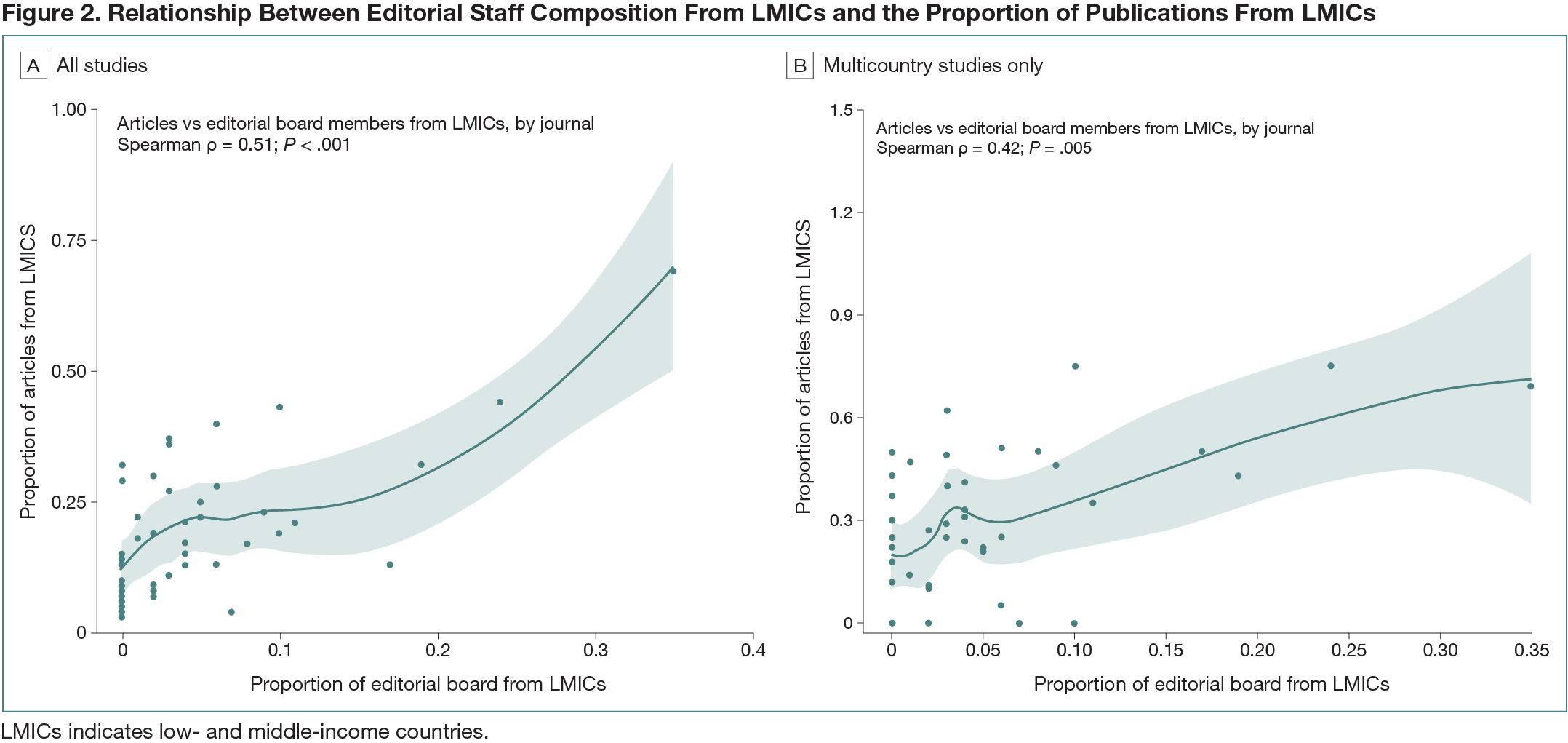Abstract
Association Between International Editorial Staff and International Publications in Leading Biomedical Journals
Gandolina Melhem,1 Chris A. Rees,2,3 Bruno F. Sunguya,4 Mohsin Ali,5 Anura Kurpad,6 Christopher P. Duggan7,8
Objective
To examine the association of having editorial staff members affiliated with low- and middle-income countries with publications from low- and middle-income countries in leading biomedical journals. It was hypothesized that greater representation from low- and middle-income countries among editorial staff would be associated with more published articles from low- and middle-income countries.
Design
A cross-sectional study was conducted of biomedical journals in 2020 in fields whose content covers the largest disease burden globally. To obtain editorial staff country affiliations, webpages of the 5 leading journals in each of the following fields were reviewed: general medicine, pediatrics, surgery, obstetrics and gynecology, cancer, cardiovascular diseases, infectious diseases, psychiatry, and nutrition. Original research articles in each journal were reviewed through MEDLINE. The study country of each original research article (ie, where the study was conducted) was determined by searching the article title, abstract, keyword, and medical subject heading using EndNote, and by 2 authors reviewing the full text of each article to assign a study country. Editorial staff country affiliations and study country location(s) were classified according to the World Bank income brackets and regions. Descriptive statistics were used to describe the proportion of editorial staff affiliated with each income bracket and region. Spearman ρ was used to assess the relation between the proportion of editorial staff affiliated with low- and middle-income countries and published articles reporting work conducted in these countries.
Results
There were 3819 editorial staff in the 45 included journals: 3637 (95.2%) were affiliated with high-income countries, 140 (3.7%) with upper−middle income countries, 37 (1.0%) with lower−middle income countries, and 5 (0.1%) with low-income countries. Every editor in chief (n = 48; 100.0%) was affiliated with a high-income country. Of the 459 associate editors, 445 (96.9%) were affiliated with high-income countries, 10 (2.2%) with upper−middle income countries, 4 (0.9%) with lower−middle income countries, and 0 with low-income countries. Editorial staff were most commonly affiliated with North American (2120 [55.5%]) and European and Central Asian countries (1256 [32.9%]). Of the 10,096 original research articles included, 7857 (77.8%) reported research conducted in high-income countries, 1562 (15.5%) in upper−middle income countries, 507 (5.0%) in lower−middle income countries, and 170 (1.7%) in low-income countries. Greater editorial staff representation correlated moderately with more published articles reporting research conducted in low- and middle-income countries among all articles (Spearman ρ, 0.51; P < .001) and among articles reporting multicountry studies (Spearman ρ, 0.42; P = .005) (Figure 2).
Conclusions
The inclusion of editorial staff affiliated with low- and middle-income countries may be an approach to promoting the publication of research conducted in low- and middle-income countries.
1Precision Vaccines Program, Boston Children’s Hospital, Boston, MA, USA, chris.rees@emory.edu; 2Division of Pediatric Emergency Medicine, Emory University School of Medicine, Atlanta, GA, USA; 3Children’s Healthcare of Atlanta, Atlanta, GA, USA; 4School of Public Health and Social Sciences, Muhimbili University of Health and Allied Sciences, Dar es Salaam, Tanzania; 5Division of Infectious Diseases, Department of Paediatrics, The Hospital for Sick Children, Toronto, ON, Canada; 6Department of Physiology and Nutrition, St. John’s Medical College, Bengaluru, India; 7Center for Nutrition, Division of Gastroenterology, Hepatology and Nutrition, Boston Children’s Hospital, Boston, MA, USA; 8Department of Nutrition, Harvard T. H. Chan School of Public Health, Boston, MA, USA
Conflict of Interest Disclosures
None reported.
Funding/Support
Christopher P. Duggan was supported in part by the National Institutes of Health (K24DK104676 and 2P30 DK040561).
Role of the Funder/Sponsor
The funder had no role in the study design or in the collection, analysis, or interpretation of the data. The funder did not write the report and had no role in the decision to submit the abstract for presentation.
Acknowledgments
Gandolina Melhem and Chris A. Rees are co−first authors. We thank Chloe Rotman, at Boston Children’s Hospital, for her assistance in developing the PubMed query as well as acquiring the full-text articles reviewed in this study.

